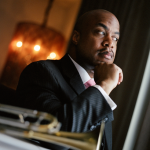National Endowment for the Arts Announces $135,000 in NEA Jazz Masters Live Grants
Grants support unique opportunities to engage with NEA Jazz Masters through performance and education opportunities
Announcement made during 30th anniversary celebration of NEA Jazz Masters program
New York, NY– At last night’s celebration of the 30th anniversary of the NEA Jazz Masters program, Rocco Landesman, chairman of the National Endowment for the Arts, announced that 12 not-for-profit organizations will receive grants totaling $135,000 to bring outstanding jazz musicians, writers, producers, and scholars to communities across the nation through NEA Jazz Masters Live. Managed by Arts Midwest, NEA Jazz Masters Live grants support performance and educational activities featuring NEA Jazz Masters, recipients of the nation’s highest honor in jazz. The program offers audiences the unique opportunity to engage with the Jazz Masters through such activities as performances, master classes, clinics, lectures, and short term residencies.
“There is no substitute for being in the presence of a great artist, and through the NEA Jazz Masters Live grants, the NEA is pleased to provide opportunities for Americans all across this country to have exactly that experience,” said NEA Chairman Rocco Landesman. “Twelve exceptional organizations will be our partners this year, and we are pleased to once again work with Arts Midwest in administering these grants.”
Among the NEA Jazz Masters scheduled to participate in NEA Jazz Masters Live events are 2012 NEA Jazz Masters Jack DeJohnette, Sheila Jordan, and Jimmy Owens, as well as Kenny Barron, Chick Corea, and Randy Weston. Of the twelve organizations chosen this year, a third are first-time recipients of NEA Jazz Masters Live grants.
Organizations chosen for the 2012 NEA Jazz Masters Live are:
§ Artists Collective (Hartford, CT)
§ Burlington Discover Jazz Festival, Flynn Center for the Performing Arts (Burlington, VT)
§ DC Jazz Festival (Washington, DC)
§ *Deer Isle Jazz Festival (Stonington, ME)
§ *Harlem Stage (Aaron Davis Hall) (New York, NY)
§ *Healdsburg Jazz Festival (Healdsburg, CA)
§ Monterey Jazz Festival (Monterey, CA)
§ New Mexico Jazz Festival, Outpost Productions (Albuquerque, NM)
§ *Tribeca Performing Arts Center (New York, NY)
§ Tri-C JazzFest (Cleveland, OH)
§ University Musical Society (Ann Arbor, MI)
§ “We Always Swing” Jazz Series (Columbia, MO)
*First-time recipient of an NEA Jazz Masters Live grant.
About NEA Jazz Masters and NEA Jazz Masters Live
Each year since 1982, the Arts Endowment has conferred the NEA Jazz Masters Award to living legends who have made major contributions to jazz. With this new class, 124 awards have been given to great figures of jazz in America, including Count Basie, Dave Brubeck, Sonny Rollins, Nancy Wilson, and the Marsalis family.
NEA Jazz Masters are selected from nominations submitted by the public and receive a one-time fellowship award of $25,000, are honored at a public awards ceremony, and may participate in NEA-sponsored promotional, performance, and educational activities. Only living musicians or jazz advocates may be nominated for the NEA Jazz Masters honor.
NEA Jazz Masters Live celebrates these NEA Jazz Masters by offering funding nationally to support innovative engagements featuring the Masters and their music. Since the program’s inception in 2008, NEA Jazz Masters Live has provided 48 grants to arts organizations, which has resulted in 90 performances and 150 outreach activities conducted by NEA Jazz Masters, reaching more than 150,000 people in communities across the country.
The NEA has created numerous resources as part of the NEA Jazz Masters program, including:
· Video tributes, brief video tributes to recent NEA Jazz Masters’ lives and careers in jazz,
· Jazz Moments, 222 short audio pieces featuring musical excerpts and short interviews with NEA Jazz Masters,
· Podcasts with NEA Jazz Masters and other jazz figures about the history and current state of jazz,
· In-depth interviews with more than 45 NEA Jazz Masters,
· NEA Jazz in the Schools, a free, five unit, online curriculum created in partnership with Jazz at Lincoln Center that explores jazz as an indigenous American art form and a means to understand American history,
In addition, the NEA supports the Smithsonian Jazz Oral History Program, an effort to document the lives and careers of NEA Jazz Masters. By the end of January 2012, 58 oral histories with NEA Jazz Masters will be available on this website, with a total of 80 by September. In addition to full transcripts of the interviews, which average six hours in length, the website also includes audio highlights. The interviews cover a wide range of topics including early years, initial involvement in music and jazz, as well as personal experiences in the jazz music world.
About the National Endowment for the Arts
The National Endowment for the Arts was established by Congress in 1965 as an independent agency of the federal government. To date, the NEA has awarded more than $4 billion to support artistic excellence, creativity, and innovation for the benefit of individuals and communities. The NEA extends its work through partnerships with state arts agencies, local leaders, other federal agencies, and the philanthropic sector. To join the discussion on how art works, visit the NEA at arts.gov.
About Arts Midwest
Arts Midwest promotes creativity, nurtures cultural leadership, and engages people in meaningful arts experiences, bringing vitality to Midwest communities and enriching people’s lives. Based in Minneapolis, Arts Midwest connects the arts to audiences throughout the nine-state region of Illinois, Indiana, Iowa, Michigan, Minnesota, North Dakota, Ohio, South Dakota, and Wisconsin. One of six non-profit regional arts organizations in the United States, Arts Midwest’s history spans more than 25 years. For more information, please visit artsmidwest.org.
# # #


